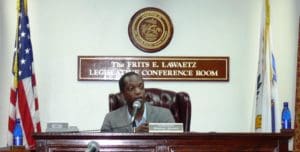
The trial for former Sen. Wayne James on federal corruption charges has been postponed again, awaiting a ruling on his argument that if he asked for money for a legitimate legislative reason, he is immune from prosecution for pocketing taxpayer money.
A panel of the U.S. Third Circuit Court of Appeals heard the appeal Dec.12 but has yet to issue a ruling. James’ attorneys argue that as some of what James did can be construed as a legitimate legislative action, that confers an immunity broad enough that the government may not question whether he submitted fake invoices and pocketed government cash.
In October, District Court Judge Curtis Gomez rejected James’ motion to dismiss the charges, leading to the appeal. If James succeeds in persuading the appellate court that Gomez interpreted the law wrong, the charges against him will be dismissed.
Elected to one term in 2008, James was a V.I. senator on St. Croix from January 2009 to January 2011.
A 2011 joint federal and local audit of the V.I. Legislature found widespread misuse of taxpayer funds. Several of the most egregious incidents involved an unnamed senator, later revealed to be James. James reportedly received 12 cash advance checks totaling $93,914 in 2009 as payment to the Danish National Archives for research, scanning, reproduction and translation of historic documents. While the report did not mention James by name, James held a press conference in 2009 announcing his research findings from that trip.
Auditors found James never submitted any receipts or invoices. When asked about the advances, James said some of the cash is in safe deposit boxes outside of the territory.
“We interviewed the senator, who told us that he rescheduled the trip and was keeping the cash advance in an off-island safety deposit box. We later determined that the trip was never taken and the money was never returned. After our repeated inquiries and a meeting with the senate president, the senator returned the money in June 2010,” auditors wrote in a 2011 report signed by V.I. Inspector General Steven van Beverhoudt and U.S. Interior Department acting Inspector General Mary Kendall.
Soon afterwards, James vanished. A federal warrant was issued in October 2015. The former senator was arrested in July 2016 at a friend’s apartment in Nonantola, Italy, on federal corruption charges. Italy extradited him and he has been on house arrest for two years now while he awaits trial.
The charges carry penalties of as much as 20 years in prison.
James’ attorneys filed for the charges to be dismissed, arguing that federal and V.I. law make James immune for arrest for activities during his term of office that are connected to his legislative activities. They argue James sponsored legislation commemorating V.I. historical events and used his research in Denmark in that legislation.
Gomez rejected that argument, citing cases that distinguished legislative acts from acts that were ordinarily criminal and not essentially legislative.
“Here, James is alleged to have double-billed for expenses, filed sham invoices, and converted government funds,” Gomez wrote in a memorandum opinion issued Oct. 26. “The court finds that obtaining cash advances or reimbursements and depositing them into a personal account, double-billing the legislature, or submitting invoices for work either completed prior to his senatorial term or not at all do not qualify as legislative acts,” he concluded, denying the motion.
James appealed Oct. 27, again asserting that the research he did constitutes legislative acts which are protected by immunity.
In a new brief filed Nov. 30, his attorney’s responded directly to Gomez’ ruling that pocketing cash advances and double billing are not legislative acts protected by immunity.
The brief does not address whether double billing, pocketing funds or submitting sham invoices are legitimate legislative acts. Instead they argue if James’s stated reason for getting government money is a legitimate legislative act then he is immune regardless of what he actually did with the money and the court cannot look into the matter.
“The government’s case rests on the contention that Mr. James lied to the Legislature when he sought funds for Fireburn-related legislation during “in or about” that time period – not merely on those few occasions cited by the lower court above,” his attorneys argue in the Nov. 30 brief.
“The government ignores that its case hinges upon the jury’s evaluation of whether Mr. James’ stated intentions for seeking the funds at issue was true. Since that stated purpose was unambiguously legislative, as evidenced by the testimony of his staff, debates on the senate floor, correspondence with legislative officials, and bills themselves, the government’s case should be dismissed,” they conclude.
The trial has been postponed until 9 a.m. Feb. 6, in U.S. District Court on St. Croix. If the court does not rule on the appeal befor ethat date it may be postponed again.





